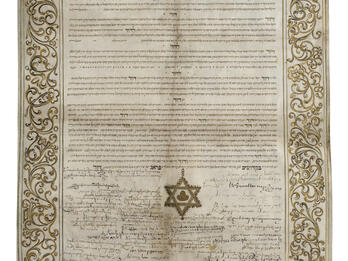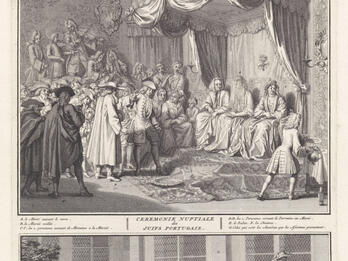Gevurot ha-shem (Mighty Acts of the Lord): On Passover
Chapter 52
And we may remove the [Seder] table, so that the young child should express wonder at why we are removing the table; for surely it would be appropriate to eat now that we are already leaning. And he [the father] should reply to him that we are obliged to relate the story of the Exodus from Egypt before the meal. But nowadays we do not observe the custom of removing the entire table; instead we merely remove the Seder plate together with the matzah.
And then we pour the second cup of wine and begin “why is this night different?” (“Mah nishtanah”), in which we note all the deviations from standard practice that we make on this night. Now there are some who wonder why we find no response in the Haggadah to [the questions raised in] the “Mah nishtanah,” and on account of this they have offered explanations that are far removed from the truth. However, all this presents no problem, for the answer clearly appears at the end of the passage where the father responds with regard to the paschal lamb, the unleavened bread, and the bitter herbs when he arrives at that point. However, the passage “We were slaves” constitutes the beginning of the narrative. Likewise, in regard to the question of why we lean, the father responds, “In every generation a person is obliged to regard himself as having gone out of Egypt,” etc. And it is because we must see ourselves—each one of us!—as if he had personally gone out of Egypt, we need to assume a posture of leaning, so that one appears to be a free man; hence the father is responding to every point appropriately.
However, there is no need for all these things, and no genuine problem exists, for the “Mah nishtanah” passage is the inquiry of the talmudic scholar, as appears in chapter ten [b. Pesaḥim 116a]: “If he is a wise man, his son asks him; and if not, his wife asks him,” etc., “and even in a case where there are two talmudic scholars seated together they ask one another ‘Why is this night different?’” etc. It follows that the “Mah nishtanah” passage constitutes the query of the talmudic scholar.
And the explanation of the “Mah nishtanah” passage is as follows. Of course, as a talmudic scholar he knows full well that the eating of unleavened bread is a symbol denoting freedom, and similarly that the bitter herbs are a symbol for slavery, and the leaning is a symbol of freedom, and the same applies to all the items mentioned in the “Mah nishtanah” passage. However, what he is really asking is: “What has this to do with us? What happened to us that make us perform symbolic acts of freedom and of slavery, and where did these occur?” And here the one leading the Seder replies; “We were slaves to Pharaoh,” etc. Now the response is appropriate; and this is the correct explanation.
Now there is no reference here to the four cups of wine, as one does not mention anything which is legislated by the sages. However, the eating of unleavened bread and bitter herbs is not an enactment of the sages. Although [in “Mah nishtanah”] it states: “We all lean”—a practice similarly of rabbinic origin—nonetheless, since the leaning is for the purpose of eating the unleavened bread, which is of biblical origin—for the unleavened bread must be eaten while leaning—his question on this point is well-founded.
And likewise, in regard to the two acts of dipping, even though the first dipping is of rabbinic origin, and also the ḥaroset [fruit and nut mixture] involved in the second dipping is of rabbinic origin, we nonetheless ask about this [in the “Mah nishtanah”], for the meaning of this question is as follows: “On this night there are two acts of dipping, and, in one of these, bitter herbs, which are of biblical origin, are involved.” Even though the ḥaroset itself is merely of rabbinic origin, since the purpose of the ḥaroset is to make more palatable the bitter herbs, which are of biblical origin, it is entirely appropriate that a question should be raised concerning it in the “Mah nishtanah.” However, one does not ask [in the “Mah nishtanah”] about the four cups, which are entirely of rabbinic origin with no biblically based elements at all. Moreover, on other nights a person has to drink as well; the fact that he drinks four cups on this night does not constitute a fundamental change from the norm.
Translated by
Credits
Judah Loew ben Bezalel, Gevurot ha-shem: ʻIm hagadah shel Pesaḥ (Mighty Acts of the Lord: Commentary on the Passover Haggada), vol. 2 (Jerusalem: ʻOz ve-hadar, 2003), pp. 39–48.
Published in: The Posen Library of Jewish Culture and Civilization, vol. 5.








